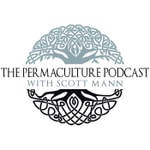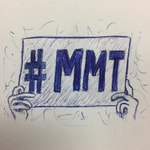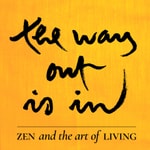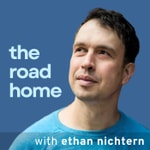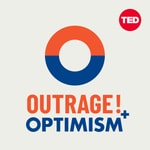AfterThought – Details, episodes & analysis
Podcast details
Technical and general information from the podcast's RSS feed.
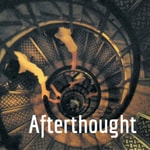
AfterThought
CDK
Frequency: 1 episode/6d. Total Eps: 17

Recent rankings
Latest chart positions across Apple Podcasts and Spotify rankings.
Apple Podcasts
🇨🇦 Canada - philosophy
26/11/2024#82
Spotify
No recent rankings available
Shared links between episodes and podcasts
Links found in episode descriptions and other podcasts that share them.
See all- https://drawdown.org/
110 shares
- https://www.joannamacy.net/
27 shares
RSS feed quality and score
Technical evaluation of the podcast's RSS feed quality and structure.
See allScore global : 63%
Publication history
Monthly episode publishing history over the past years.
16. Conclusion Part 2: Beyond Hope for the Future: Compassion and Resolve
Season 1 · Episode 16
mercredi 23 décembre 2020 • Duration 31:27
We begin with where the podcast started: one of the characteristics of the contemporary world, which is both an active contributor to, as well as a passive reflection of, its being in crisis, is that in contrast to the modern worldview’s ideal of some magisterial overview, our current moment refuses any such overview. Such an overview appears now as impossible and implausible; part of the modern-Western-cum-ultramodern-global mythology we need to put behind us. Instead, we are all caught up inside this global moment, caught up in a plurality of incompatible worldviews and contradictory stories, incapable of escaping our inherence in this complex diversity and forced to make our way with great uncertainty. How to live in this moment, without resorting to either hopelessness or despair or inauthentic hope, with the courage, resolve, and above all, the compassion, that is needed? And beyond living in this moment, how are we to transform ourselves in the midst of the ending of the world such that a new human being emerges, ready to live – viably, sustainably, resiliently - in the new world that will come after the ending of the old?
(Note: many of the references made to hope and the psychology of climate change in this episode were already given in the notes accompanying Episode 5.)
A couple further references on hope:
Joanna Macy (who was mentioned in Episode 5 as well) remains a psychologist of global climate change par excellence: https://www.joannamacy.net/ .For some of her work on “active hope”, see https://www.activehope.info/joanna-macy.html
Jonathan Lear’s analysis of hope for the Crow nation as it struggles to survive is rich, deep, and pertinent: Jonathan Lear. (2006). Radical hope: Ethics in the face of cultural devastation.
Relative to references made to a non-ego actor invokes the work of Bruno Latour and “actor-network” theory, Donna Haraway, and others, that helpfully focus on breaking down nature-culture, passive mechanical natural subject vs active conscious human agent, dichotomies.
For example:
Latour, Bruno. (2017). Facing Gaia: Eight Lectures on the new climactic regime.
Haraway, Donna. (2008). When species meet.
15. Conclusion Part 1: Strategies for Thinking the Present
Season 1 · Episode 15
mardi 22 décembre 2020 • Duration 29:02
In this episode, (part one of our two-part conclusion), we aim to tie together – like a nice bow on a Christmas present, know what we mean? – a number of themes (“thoughtlines”) raised throughout the series that present a diverse number of strategies for thinking the present. We engage the notion of thinking strategically relative to scale, and compassionate readings as preferable to egocentric ones. We recur to the theme of “sitting with” rather than getting things done, a spiritual demand the ego resists. How to affirm community rather than technology; the importance of thinking in critical, two-sided terms rather than in polarized terms; and equally, the importance of identifying resources to deal with the present moment rather than a focus on solutions.
6. The Scientific Revolution and the Modern West
Season 1 · Episode 6
jeudi 5 novembre 2020 • Duration 30:42
The scientific, as well as political, and industrial revolutions that are key to the development of the “modern West” and its worldview from 1500 to WWII are examined. The shattering of the medieval Western worldview through discovering deep space, deep time, deep process, and finally deep consciousness, is traced; connections between this development and the podcast's earlier discussion of “expansionism” are explored. Understanding WWII as the culmination of the modern Western period and the end of centuries of European imperialism and colonialism is discussed, particularly in relation to how the ideology of “infinite growth” transforms through the war into a global phenomenon.
Some recommended sources for “history of the West” to understand the emergence of the modern Western world & worldview:
Arendt, Hannah. (1968). The human condition. Chicago: University of Chicago Press.
Tarnas, Richard. (1991). The passion of the Western mind. New York: Ballantine Books.
Taylor, C. (1989). Sources of the self: The making of the modern identity. Cambridge, MA: Harvard University Press.
5. Mobilization
Season 1 · Episode 5
jeudi 29 octobre 2020 • Duration 28:19
This episode examines the modern worldview in terms of its understanding of unlimited growth, and how this set the context for World War II and the Great Acceleration. Throughout there is a focus on the theme of mobilization: different ways to understand mobilization, and how to apply the precedent of WWII mobilization to our own times. In discussing this, some of the psychology incurred relative to our world in crisis, climate change, and mobilizing to meet these challenges is explored.
References:
As mentioned in the previous episode, Margaret Klein Salomon is a clinical psychologist who develops the "climate mobilization" movement in response to our climate crisis. (https://www.theclimatemobilization.org/)
Joanna Macy is one of the groundbreaking psychologists of climate change, described as the “psychologist of climate change par excellence” in this episode (https://www.joannamacy.net/main)
One person she worked with was Arne Naess (1912-2009), who coined the term “deep ecology”. What is perhaps not so well known is the strong psychological underpinnings of deep ecology, which are worth considering: the notion that a good ecological relationship to the earth is inseparable from a richer, more vital sense of self, whereas an impoverished, damaged relationship correlates to an impoverished experience of self. http://www.deepecology.org/deepecology.htm
A couple further contemporary psychologists of climate change:
Renee Lertzmann https://reneelertzman.com/
Susanne Moser http://www.susannemoser.com/
Jem Bendell is not a psychologist, but his provocative and influential “Deep Adaptation” proposal (which has become a small movement) is heavily psychological in its response to climate change https://deepadaptation.info/
We'd love to hear from you! Feel free to get in touch with us on instagram @afterthought_podcast, facebook @AfterthoughtPodcastCDK, or by emailing us at afterthoughtpodcast2019@gmail.com
4. State of Emergency: World War II as Precedent for Today
Season 1 · Episode 4
jeudi 22 octobre 2020 • Duration 29:27
In this episode we look at what we’re calling “expansionism”, how the natural tendency of a species to expand into its niche, is unnaturally extended beyond those natural limits by humans. Pursuing this thoughtline brings us to a discussion of World War II as a historical precedent for our world in crisis today, particularly the theme of the war mobilization as precedent for addressing the current climate emergency.
A few of the references made:
Rachel Carson's book Silent Spring, published in 1962. (http://www.rachelcarson.org/SilentSpring.aspx)
Margaret Klein Salomon and the Climate Mobilization organization (https://www.theclimatemobilization.org/)
For a Canadian version: Seth Klein, A Good War: Mobilizing Canada for the Climate Emergency (published in September 2020, after we finished making this podcast but when we started releasing the episodes
Project Drawdown (https://drawdown.org/)
New episodes coming out every Thursday! We'd love to hear from you! Feel free to get in touch with us on instagram @afterthought_podcast, facebook @AfterthoughtPodcastCDK, or by emailing us at afterthoughtpodcast2019@gmail.com
3. Thinking at Different Scales: The Great Acceleration
Season 1 · Episode 3
jeudi 15 octobre 2020 • Duration 29:21
In this episode we will explore the notion of thinking at different timescales. We will look at four different time scales: the Great Acceleration (1950-2020), Holocene (last 10,000 years), Anthropocene (current epoch), and the emergence of Homo Sapiens (200,000 years).
Some references:
On the notion of "crisis" in Chinese meaning danger + "incipient moment" (rather than opportunity), reference is to Sinologist Victor Mair. See http://www.pinyin.info/chinese/crisis.html
On the Great Acceleration, the work of Will Steffen and others; graphs depicting different components of the Great Acceleration are first published in 2004, the updated in 2010. (cf. http://www.igbp.net/globalchange/greatacceleration.4.1b8ae20512db692f2a680001630.html)
On the notion of a "safe operating space", the phrase comes from Johan Rockstrom and others working out of the Stockholm Resilience Center, two major papers published in 2009 in Ecology & Society and in Nature researching "planetary boundaries".
New episodes coming out every Thursday! We'd love to hear from you! Feel free to get in touch with us on instagram @afterthought_podcast, facebook @AfterthoughtPodcastCDK, or by emailing us at afterthoughtpodcast2019@gmail.com
2. Thinking the Present Moment Part 2: Coronavirus and the Impossible
Season 1 · Episode 2
jeudi 8 octobre 2020 • Duration 31:05
In this episode we take a closer look at the COVID-19 global pandemic and corresponding lockdown, discussing what possibilities for reflection and potential transformation the experience of lockdown affords. New episodes coming out every Thursday! We'd love to hear from you! Feel free to get in touch with us on instagram @afterthought_podcast, facebook @AfterthoughtPodcastCDK, or by emailing us at afterthoughtpodcast2019@gmail.com
1. Thinking the Present Moment: The World as a Convergence of Crises
Season 1 · Episode 1
jeudi 1 octobre 2020 • Duration 34:21
In this first episode of the Afterthought series we introduce some of the global crises that our world is faced with, and start to explore what it means to think strategically about coronavirus, climate change, and the end of the world. New episodes coming out every Thursday!
For anyone interested in the reference to Chris Peet's book, it is:
Practicing Transcendence: Axial Age Spiritualities for our World in Crisis, published in 2019 by Palgrave MacMillan. (https://www.palgrave.com/us/book/9783030144319)
We'd love to hear from you! Feel free to get in touch with us on instagram @afterthought_podcast, facebook @AfterthoughtPodcastCDK, or by emailing us at afterthoughtpodcast2019@gmail.com
Trailer
samedi 19 septembre 2020 • Duration 02:16
Meet your hosts for Afterthought podcast! Dawson Strand, Chris Peet, and Karambir Singh.
14. The Ego and its Discontents
Season 1 · Episode 14
lundi 21 décembre 2020 • Duration 28:05
The identification of the ego with power structures greater than itself, raises a whole host of questions around ego identity as healthy vs unhealthy; around tribal identity and tribalism and its transformation with the emergence of civilization. What role does mythology play relative to this complex set of issues? What about the psychology activated when confronting civilizational collapse? Are there psychologies that recognize consciousness beyond that of the conventional ego?
References
Civilizational collapse gets named on a few occasions, explicitly citing Jared Diamond as best-known example.
Joseph Tainter, 1988, “The collapse of complex societies”, is perhaps “the classic” that begins a subfield of study on the theme.
Jared Diamond’s book is from 2005: “Collapse: how societies choose to fail or succeed”
Reference is made in this episode to conventional psychologies of the ego wherein health means well-adapted to society, over against more radical or spiritual psychologies that see the ego itself as the problem and society as problematic enough such that being adapted to it is unhealthy. Arguably, the whole psychodynamic tradition, from Freud to Jung as its founders, right up the whole field of “transpersonal psychology”, plays on the conventional/spiritual distinction. (See, for example, Freud's "Civilization and its discontents" (1930) from which this episode derives its title. )
Norman O. Brown brilliantly explored within psychoanalysis some of these themes in his works “Life against death: The psychoanalytical meaning of history” (1959) and “Love’s Body” (1966)
An example of that distinction (overt in the title already) is by Daniel Brown, Jack Engler, and Ken Wilber, 1986, “Transformations of Consciousness: Conventional and Contemplative Perspectives on Development”
A favorite psychologist of mine (i.e. Chris) who articulates the notion of being "positively maladjusted" to unhealthy society, alongside the theme of ego-death or “disintegration” as potentially positive is Kazimierz Dabrowski (“Positive disintegration”, 1964). See the website https://positivedisintegration.com/
Terror-management theory also gets mentioned: for this theory, see Jeff Greenberg, Sheldon Solomon, and Tom Pyszczynski, 2015, “The Worm at the Core: On the Role of Death in Life”. https://ernestbecker.org/resources/terror-management-theory/





